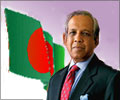
Sep 11: Ever since the caretaker military government of Bangladesh took hold of the politics and start a massive anti-corruption crackdown in the country, the circumstances is moving in favour of restoring democracy in the world’s third largest Muslim country. On Monday in another development the military-backed administration allowed political parties to hold talks by lifting a six month long ban on interior politics ahead of the general election in 2008.
The government has now allowed all political parties to hold dialogues in order to undertake a successful electoral reform that can pave the way to retain democracy. The interim government has in constant effort from the time of emergency to restore democracy in the nation by the end of 2008.
However, the administration has also directed political parties to hold meeting only in indoor space or community centres and not outside the capital, Dhaka. As per the statement of the chief advisor of interim government, Mr. Fakhruddin Ahmed, the decision to relive restriction can further facilitate political process by creating an understanding for a proficient electoral reform.
“The government would amend elections laws and rules after talks with the commission. And all actions of his caretaker administration were aimed at establishing good governance in society, politics, and economy and giving democracy a strong footing.”, Ahmed said in his address to the nation.
Ahmed along with a 10 member advisory council was formed just after the declaration of emergency in last January following a large scale political violence that leaves hundred of people dead. In fact the Awami League party and its supremeo Sheikh Hasina had protested against the handover of power to an interim government after the Bangladesh Nationalist Party (BNP) led by Khaleda Zia’s term ended ahead of election. But Hasina accused the Election Commission of being biased by launching a massive protest on October 2006.
The protest brought large scale street violence until the military backed care taker government took charge appointing Fakhruddin Ahmed as chief advisor. The interim government to its credit banned all political parties and started arresting top most political leaders under corruption charges along with Khaleda Zia and Sheikh Hasina. On March 08, the government banned all political activities.
However, the recent decision of rid of the ban on indoor politics came just after the request of Election Commission to allow political parties in dialogue with each other. As Bangladesh has already spent much time in military rule as far as its painful history is concerned, it would be great for the people of the nation to come up with a democracy that can drive the nation forward in a growth path.
|
|
Read More: Ahmed Nagar


Comments: